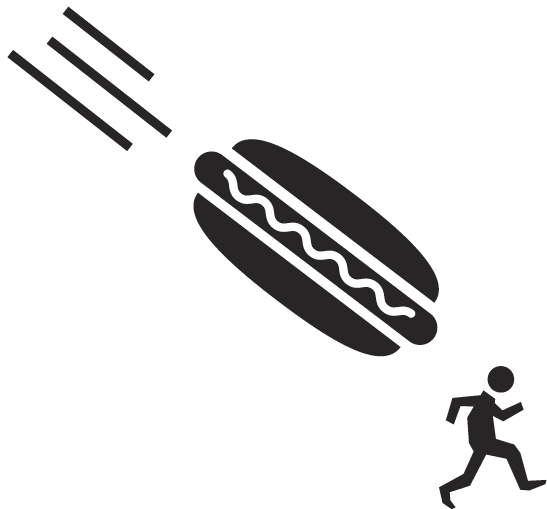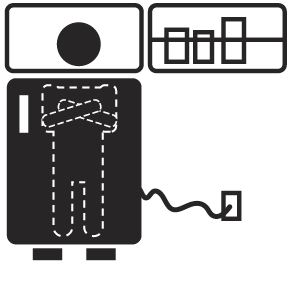
What Would Happen If . . .
You Were Stuck in . . . ?
CLAUSTROPHOBIA, THE FEAR of suffocation or being confined, is one of the world’s most common phobias. Studies suggest that at least 5 percent of the world’s population suffers severely from it, but in nearly every case the fear is unwarranted. It’s a gross overreaction of the body’s fight-or-flight response that usually does more harm than good.
However, there are some places where you should be concerned if you happen to find yourself stuck, where even the most claustrophobic brain may undersell the danger. Here’s what would happen if you were stuck in . . .
An Airplane Wheel Well

Since 1947, 105 people have stowed away in an airplane’s wheel well. In nearly every case it was a bad idea. But if you’re still on the fence about buying a seat, we’ll make a pros-and-cons list of stowing away in a wheel well for you.
Pros:
- It’s cheap.
- You can skip the Ambien. Once the plane reaches cruising altitude you will pass out from lack of oxygen and remain unconscious for the remainder of the flight.
- Depending on the airliner you may actually have more leg room than in coach.
That’s about it for the pros.
Cons:
- The odds aren’t in your favor. Of the 105 people that we know of who opted to fly wheel-well class, only a quarter survived, and most of the survivors were either young (with less body mass younger people cool down faster, and we’ll get to why that’s a good thing later) or on short flights that don’t fly as high (for which we would recommend a bus).
- The cold problem. At 35,000 feet it’s 65 degrees below zero outside. You will have a bit of insulation once the wheel door closes, so the cold probably won’t kill you, but don’t be surprised if you lose a digit or two.
- The exposure issue. There are no seat belts in wheel-well class, and the doors open for landing when you’re still at a few thousand feet. You would not be the first to fall. We would say hold on, but because of the lack of air you’re going to be unconscious.
- The lack of oxygen. This is the real killer. At 35,000 feet the air is so thin the oxygen you breathe drops to 25 percent of what you’re used to. People get woozy at 50 percent, so unless you are acclimated you will pass out unexpectedly and die a few minutes later. Your best shot is to allow yourself to nearly freeze to death. Your brain needs far less oxygen when chilled, so wearing shorts and a T-shirt may actually be a better idea than a jacket. You will probably lose at least some of your fingers and toes to frostbite, but as long as you’re not dropped you may make it out of this.
Conclusion: The trip won’t cost you an arm and a leg, just some portion of your hands and feet. If you’re really lucky.
A Gas Station (Or: What Would Happen If You Lived on a Diet of Only Junk Food?)

Surviving a single gas station hot dog is a feat, so how long could you live on a diet of them?
Junk food, for all its faults, preserves quite well. Potato chips last a long time, and it’s unclear if a Twinkie will ever rot, so you would not starve, though if you ate junk food and soda for years you would probably develop diabetes. However, there’s a more short-term problem: Junk food has practically no vitamins or minerals, so while it makes for a good snack, it’s a poor meal.
If there were any fresh fruit in your gas station, it would expire within a few days. And without fruit you would get almost no vitamin C, which is one of the worst to skip if you’re going without vitamins.
In the early 1500s bigger boats and better maps made long sea voyages possible. Unfortunately, food preservation lagged behind—which meant no fresh food, no vitamin C, and the inevitable result: scurvy.
Magellan lost 80 percent of his sailors to scurvy on a voyage across the Pacific, and even by 1740, thirteen hundred sailors died of it in ten months aboard a ship captained by the explorer George Anson.*
A month after you started your diet of pure junk food in the gas station, you would show the first signs of scurvy (gum bleeding, fatigue, skin spots). After another month you would be unable to repair your capillaries and you would bleed to death.
Conclusion: If you’re ever stuck in a gas station, you had better hope it stocks multivitamins.
An Elevator
The record for the longest elevator ride may belong to Nicholas White, who, while working late one Friday evening in October 1999, took the elevator for a smoke break and didn’t get off it for forty-one hours. The technicians apparently didn’t check to see if anyone was inside before shutting it down. White spent a very boring weekend in the small box but was eventually discovered and rescued, and, according to Mr. White, in need of only a beer.
It was a good thing White wasn’t stuck much longer, because elevator trappings can be lethal. In 2016 in a busy Beijing apartment complex, an elevator malfunctioned between the tenth and eleventh floors and technicians cut its power without seeing if anyone was in it. Someone was. A month later her body was discovered.
The greatest danger when trapped in an elevator is lack of water. Elevators have good ventilation, so oxygen isn’t a problem, but dehydration is. Just sitting around sweating and breathing, you lose two cups of water per day—and then there’s the peeing.
Urine is 95 percent water, and after a few days stuck in an elevator, extreme thirst may make it look like a refreshing beverage, but your body is getting rid of the remaining 5 percent for a reason. It’s filled with enough potassium to send you into kidney failure if you drink too much. There’s also enough sodium in it to make it a poor choice for hydration.* The U.S. Army’s survival handbook advises against drinking it.
As you lose more and more water through sweating, peeing, and exhalation, your blood becomes thicker and thicker, oozing through your veins until your heart can no longer pump; meanwhile, your kidneys are being poisoned from blood that’s too concentrated.
Conclusion: If you get stuck in an elevator, you have about two weeks before you die of kidney failure—and pass on the pee while you’re in there.
A Walk-in Freezer

Modern walk-in freezers are required to open from the inside, so you cannot be locked in. But what if you got stuck in an old one wearing shorts and a T-shirt?
In the 10-degrees-below-zero temperature of a meat locker, your body will reroute your blood to your core to keep your vital organs warm, which will leave your extremities out in the cold. That means frostbite, and in a meat freezer that would happen within thirty minutes. If you were able to stay alive, your fingers would eventually blacken, die, and require amputation. But you would be dead long before that became a concern.
In a meat locker your body temperature would fall a degree every thirty minutes, so after six hours your body temperature would fall to 86 degrees and your cells would stop working. Unfortunately, all you are is a bunch of cells.
Conclusion: You have only six hours before you join the meat section. According to FDA rules for similar meat (veal) you would stay fresh for four to six months before you would have to be thrown out.
Quicksand

In the enormous world of overstated Hollywood risks, dying a horrible death in quicksand might take the top spot—which, from the industry that gave us forty-foot sharks, killer computers, and alien parasites, is saying something.
Despite what you might have seen, there have been no confirmed deaths in quicksand ever. Zero. A few people might have been stuck in mud near the shore break and drowned in the incoming tide, but that’s it.
The reason for quicksand’s lack of lethality is that you float in it. It’s twice as dense as water, and you already float in water. If you stepped in quicksand you would sink only up to your belly button before you became neutrally buoyant. The only way you would ever be in trouble is if you went in headfirst. Avoid that and you should be fine.
Conclusion: Yes, you could conceivably die in a quicksand pit, but in all of human history you might be the first to do it.